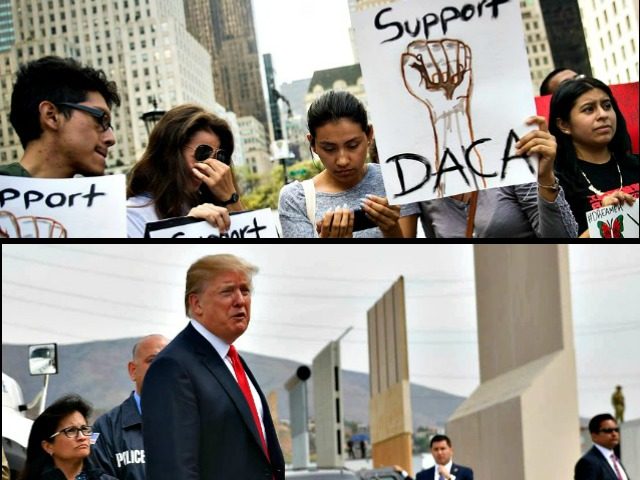WASHINGTON, DC – The Supreme Court announced on Friday it will decide the legal challenges to the Trump administration’s decision to end the DACA amnesty program for illegal aliens, with a decision in the first half of 2020 before the presidential election.
Barack Obama told the American people for three years that the Constitution and federal law did not allow him to grant amnesty for illegal aliens, that amnesty could only be authorized by Congress. In Article I, Section 8, Clause 4, the Constitution grants Congress plenary power over immigration.
After years of failing to get even a Democrat-controlled Congress to enact amnesty Barack Obama in 2012 announced a form of amnesty for illegal aliens who had entered the country as children. Then-Secretary Janet Napolitano of the Department of Homeland Security (DHS) issued a memorandum to DHS personnel mandating that they not enforce immigration law for over 400,000 illegal aliens, creating a form of amnesty.
This program was called Deferred Action for Childhood Arrivals, commonly known as DACA. In 2014, Obama expanded that amnesty to cover over 1 million adults under the similarly named program, DAPA, bringing the total number of noncitizens receiving amnesty from deportation to roughly 1.5 million.
Texas Attorney General Ken Paxton led a coalition of over a dozen states in a challenge against DAPA, arguing that the amnesty program violated (1) the Administrative Procedure Act’s (APA) requirements for public notice and comment, (2) could not be reconciled with Congress’s Immigration and Nationality Act (INA), and (3) the Take Care Clause of the Constitution.
In 2015, the U.S. Court of Appeals for the Fifth Circuit struck down DAPA, holding that DAPA violated APA’s notice-and-comment requirements and also the INA. The Supreme Court took up the case, but tied 4-4 after the death of Justice Antonin Scalia in 2016.
After President Donald Trump took office, the Department of Justice (DOJ) determined that the Fifth Circuit’s reasoning was correct on DAPA, and that the same reasons that made DAPA illegal doomed DACA as well. DHS consequently announced that it would end DACA.
Various liberals sued, including the regents of University of California (ironically currently led by the same Napolitano who first created DACA in 2012), arguing that even though Obama and Napolitano created these programs out of thin air, it nonetheless is illegal for President Trump’s team to end the program. The challengers filed suits federal districts dominated by liberal judges, and won in the lower courts.
In the final set of orders the Supreme Court handed down in its annual term – which began in October – the justices announced on Friday that they will now hear these appeals. Arguments would typically take place in November or December with a decision likely in May or June of 2020, but given the urgency of aspects of this situation, DOJ could potentially ask the Court to expedite consideration of the case. An expedited case could result in a decision closer to January.
Lawyers were curious as to why the Court did not take up these challenges sooner, but an answer might be found in the Court’s Thursday decision in the census citizenship question case, Department of Commerce v. New York. One of the hotly contested issues in that case was whether Commerce Secretary Wilbur Ross’s decision to reinstate the census question is subject to judicial review under the APA, or instead if it falls within the APA exemption for matters committed by law to agency discretion.
Roberts wrote for a majority of the Court in Department of Commercethat federal judges have jurisdiction to review the census question. But it is common practice for the Court to delay voting on whether to take a new case when it has a pending case involving an overlapping issue. One of the questions presented in the DACA cases is whether DHS’s decision to end DACA is subject to APA judicial review at all, so it is possible that the Court was just waiting until it clarified in Department of Commercethe legal standard for APA review before taking a case where the lawyers would need to argue over how that standard applies to DACA.
The Supreme Court granted review in three DACA challenges. In all three, liberal district judges had decided the challenges against DHS. But only one had been decided by the federal appellate courts. The other two still have appeals pending, and in an extremely rare move, the justices granted review in those cases as well – called a grant of certiorari before judgment – signaling the High Court agrees that this litigation is an urgent priority.
The cases are Department of Homeland Security v. Regents of the University of California, No. 15-587, Trump v. NAACP, No. 15-588, and McAleenan v. Vidal, No. 15-589, in the Supreme Court of the United States.
Ken Klukowski is senior legal analyst for Breitbart News. Follow him on Twitter @kenklukowski

COMMENTS
Please let us know if you're having issues with commenting.